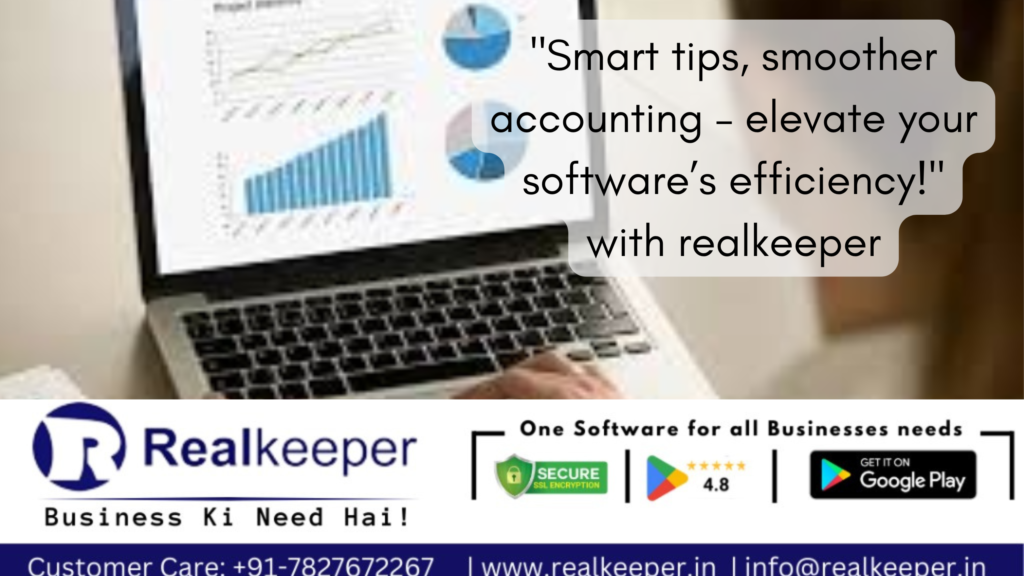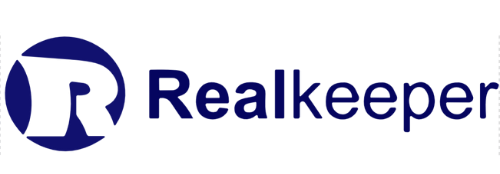SEO Meta Description: “Discover expert tips for maximizing accounting software efficiency using Realkeeper. Automate tasks, customize reports, and integrate tools for a streamlined, productive workflow.”
In today’s dynamic business landscape, maximizing the efficiency of accounting processes is critical to staying competitive. The key to this efficiency lies in leveraging your accounting software to its full potential. With Realkeeper, a robust accounting solution, businesses can not only automate repetitive tasks but also streamline their financial management, saving valuable time and reducing errors. In this blog, we’ll dive into actionable tips for maximizing accounting software efficiency, ensuring that your business reaps all the benefits Realkeeper offers.

1. Automate Routine Tasks for Maximum Efficiency
Automation is one of the primary reasons businesses adopt accounting software. Realkeeper’s automation features, like recurring invoicing, payment reminders, and bank reconciliation, help reduce manual work, allowing you to focus on more strategic business activities.
Steps to Maximize Automation in Realkeeper:
- Set up Recurring Invoices: For repeat clients, you can create recurring invoices to save time and ensure timely billing.
- Enable Automated Reminders: Use automated reminders to notify clients about due payments, reducing the need for follow-up.
- Bank Reconciliation: Connect your bank accounts to Realkeeper for automated reconciliation, ensuring all transactions are tracked accurately.
By utilizing these automation features, you’ll reduce the time spent on repetitive tasks and improve the overall productivity of your accounting department.
2. Leverage Cloud Access for Greater Flexibility
One of the most powerful features of Realkeeper is its cloud-based accessibility, which allows you to manage your financial data from anywhere, at any time. This flexibility is essential for modern businesses that have remote teams or need to access their financials on the go.
How to Maximize Cloud Features in Realkeeper:
- Access Financials on Multiple Devices: Ensure your team can use Realkeeper from any device—whether it’s a desktop, tablet, or smartphone—thanks to its cloud functionality.
- Real-Time Collaboration: Share financial data with your team or external stakeholders like accountants, ensuring everyone has the most up-to-date information.
- Backup Data Regularly: Use cloud storage to back up financial data, protecting your business from potential data loss or technical failures.
By taking full advantage of Realkeeper’s cloud capabilities, you ensure your financial processes remain flexible and scalable, adapting to your business’s evolving needs.
3. Organize Financial Data with Custom Categories
Well-organized financial data is the foundation of efficient accounting. Realkeeper allows you to categorize your transactions, making it easier to track expenses, revenue, and other key financial elements.
Steps to Optimize Data Organization:
- Create Detailed Expense Categories: Organize expenses under categories like ‘Supplies,’ ‘Rent,’ ‘Marketing,’ and ‘Utilities’ to gain clear insights into where your money is going.
- Tag Transactions for Specific Projects: Use tags to organize transactions that span multiple categories, allowing you to track costs associated with specific projects or departments.
- Regular Data Review: Periodically review and refine your categories to ensure they reflect your current business needs and provide accurate financial insights.
By organizing your financial data, you’ll streamline your reporting processes and make it easier to generate meaningful financial statements.
4. Customize Reports to Fit Your Business Needs
Realkeeper offers powerful reporting tools, allowing businesses to generate various financial reports, such as profit and loss statements, balance sheets, and cash flow analyses. Customizing these reports can give you a clearer picture of your business’s performance.
How to Maximize Realkeeper’s Reporting Features:
- Customize Key Reports: Tailor your reports to highlight the metrics that are most important to your business, whether it’s profitability, cash flow, or specific expense categories.
- Automate Report Generation: Set up automated reports that are sent directly to your inbox on a weekly or monthly basis, ensuring you always have updated financial data.
- Use Comparative Reports: Compare your current financial performance with past periods to identify trends and growth opportunities.
Efficient and tailored reporting helps you make informed financial decisions, giving your business a strategic edge.
5. Integrate Realkeeper with Other Business Tools
Integration is a key factor in ensuring the smooth operation of business processes. Realkeeper integrates seamlessly with various other tools, such as e-commerce platforms, payroll software, and customer relationship management (CRM) systems.
How to Maximize Integrations for Efficiency:
- Sync with Payroll Software: Link Realkeeper with your payroll system to automate employee payments and ensure accurate record-keeping.
- Connect CRM for Invoicing: Integrate your CRM software with Realkeeper to streamline invoicing, track customer payments, and improve overall cash flow.
- Link to E-commerce Platforms: For businesses selling online, integrating Realkeeper with your e-commerce platform ensures accurate tracking of sales, expenses, and inventory.
By integrating Realkeeper with other tools, you reduce the need for manual data entry and ensure your accounting software is part of a cohesive business workflow.
6. Stay Updated with Software Updates
Technology is constantly evolving, and accounting software is no exception. Regularly updating Realkeeper ensures you’re using the latest features and security enhancements to keep your business running smoothly.
How to Maximize Software Updates:
- Enable Automatic Updates: Set Realkeeper to automatically update, so you always have the most recent features and bug fixes.
- Educate Your Team: Make sure your team is trained on any new features introduced in the updates to ensure they’re making full use of the software.
- Backup Before Major Updates: Before performing major updates, ensure all your financial data is backed up to avoid any data loss during the process.
Keeping your software up-to-date enhances efficiency, minimizes potential downtime, and ensures that your accounting processes are secure and running optimally.
7. Provide Ongoing Training for Your Team
Even the best accounting software is only as effective as the people using it. Providing ongoing training to your team on Realkeeper’s features is essential to maximizing the software’s efficiency.
Steps to Maximize Training:
- Regular Training Sessions: Schedule periodic training sessions to keep your team up to speed on Realkeeper’s latest features.
- Create Internal Guides: Develop user manuals or quick reference guides that help your team troubleshoot common issues.
- Offer Online Resources: Provide access to online tutorials, webinars, or support forums where your team can learn more about specific features of Realkeeper.
A well-trained team is crucial to ensuring that your accounting software is used efficiently and that your business’s financial processes remain streamlined.
8. Utilize Dashboards for Real-Time Financial Data
Realkeeper’s dashboards provide a real-time snapshot of your business’s financial performance, giving you instant access to critical metrics like cash flow, outstanding invoices, and profitability.
How to Maximize Dashboard Features:
- Customize Your Dashboard: Tailor your dashboard to display the KPIs that matter most to your business, such as cash flow trends, overdue invoices, and monthly expenses.
- Monitor in Real-Time: Use the dashboard to monitor your financial data in real time, allowing you to make quicker, more informed business decisions.
- Access from Anywhere: Since Realkeeper is cloud-based, you can access your dashboard from any device, ensuring you’re always up to date on your business’s financial health.
Dashboards allow for a quick overview of your financial situation, helping you identify potential issues and opportunities without diving into detailed reports.
9. Set Up Alerts for Critical Accounting Tasks
Staying on top of critical accounting tasks is essential to maintaining smooth financial operations. Realkeeper allows you to set up alerts and notifications for important deadlines and tasks.
How to Maximize Alerts in Realkeeper:
- Create Payment Reminders: Set up alerts for upcoming payments to avoid missing deadlines and incurring late fees.
- Monitor Cash Flow: Receive notifications if your cash flow drops below a certain threshold, allowing you to take proactive measures.
- Track Outstanding Invoices: Get notified about overdue invoices to ensure timely follow-up with clients.
Alerts and notifications keep you on top of your financial obligations, reducing the risk of missed payments or overdue tasks.
10. Conduct Regular Financial Audits
Lastly, regularly auditing your financial data and processes is crucial for maintaining the efficiency of your accounting software. Audits help identify any inefficiencies, errors, or outdated workflows that may be slowing down your processes.
Steps to Conduct Financial Audits:
- Schedule Quarterly Audits: Conduct regular audits to review your financial processes and identify areas for improvement.
- Analyze Data Trends: Use audit reports to track trends in your financial data, such as cash flow fluctuations or expense increases.
- Adjust Processes as Needed: Based on the audit findings, adjust your workflows to ensure you’re using Realkeeper to its full potential.
Regular audits help you maintain high efficiency and ensure that your financial operations remain aligned with your business goals.
Conclusion
Maximizing accounting software efficiency is key to streamlining financial operations and ensuring smooth business growth. By following these tips—automating tasks, using cloud features, organizing financial data, customizing reports, and integrating with other business tools—you can make sure Realkeeper works to its full potential. Regular updates, training, and financial audits will further enhance efficiency, keeping your business’s financial management optimized and error-free.
With Realkeeper at the heart of your accounting processes, you’ll be equipped to make informed decisions, reduce manual work, and scale your business operations with ease.
4o
4. Customize Reports for Better Insights
How to Maximize Reporting in Realkeeper:
- Set up automated reports that are sent to you on a daily, weekly, or monthly basis.
Customized reports provide better insights into your business’s financial performance and allow for more informed decision-making, leading to better resource allocation and strategic planning.
5. Integrate with Other Business Tools
Efficiency in accounting software can be further enhanced by integrating it with other tools and systems your business uses. Realkeeper offers various integrations that can simplify operations by syncing data across platforms.
How to Maximize Integrations in Realkeeper:
- Integrate Realkeeper with your customer relationship management (CRM) software to streamline invoicing and track customer payments more effectively.
- Sync Realkeeper with your payroll system to ensure that employee payments are recorded accurately and on time.
- Use e-commerce platform integrations if your business operates online, ensuring seamless tracking of sales and expenses.
By integrating your accounting software with other business tools, you can eliminate the need for manual data entry, reduce errors, and ensure that your entire business operates in sync.
6. Regularly Update Software and Data
Accounting software is constantly evolving, and using the latest version of Realkeeper is key to maximizing efficiency. Regular updates bring new features, improved security, and better performance, all of which contribute to smoother operations.
How to Maximize Software Updates:
- Turn on automatic updates for Realkeeper to ensure you always have the latest features.
- Regularly back up your financial data to the cloud or an external storage device.
- Ensure that your accounting team is aware of new features introduced in updates and knows how to use them.
Keeping both your software and data updated ensures that your business takes full advantage of the latest advancements in accounting technology, reducing downtime and improving productivity.
7. Train Your Team on Best Practices
Even the most efficient accounting software won’t yield results if your team isn’t using it correctly. Ensuring that your accounting staff is well-trained on Realkeeper’s features and best practices is crucial to maximizing efficiency.
How to Maximize Training for Your Team:
- Provide regular training sessions to your accounting team to familiarize them with new features or updates in Realkeeper.
- Create user manuals or guides tailored to your business processes to help your team quickly find solutions to common issues.
- Offer refresher courses on key accounting concepts and software functionalities to ensure that team members are using Realkeeper effectively.
A well-trained team will not only be more efficient but also better equipped to handle any challenges or changes in the business environment.
8. Leverage Financial Dashboards for Real-Time Data
Realkeeper provides financial dashboards that give you a snapshot of your business’s current financial status. These dashboards are useful for making quick decisions and tracking key metrics in real time.
How to Maximize Dashboards in Realkeeper:
- Customize your dashboard to show the most important KPIs for your business, such as cash flow, outstanding invoices, and profitability.
- Use the dashboard to monitor trends and identify potential issues before they become serious problems.
- Access real-time data from anywhere using Realkeeper’s mobile app, allowing for better decision-making on the go.
Real-time dashboards allow you to stay on top of your financial situation, enabling faster, more informed decisions that can have a direct impact on your business’s success.
9. Set Up Alerts and Notifications
To ensure that no important financial task is missed, Realkeeper allows you to set up alerts and notifications. This can help you stay on track with payments, compliance, and reporting deadlines.
How to Maximize Alerts in Realkeeper:
- Set up notifications for upcoming bill payments and tax filing deadlines.
- Enable alerts for low cash flow or unpaid invoices that are overdue.
- Use notifications to remind your team of important accounting tasks that need immediate attention.
By leveraging alerts and notifications, you can prevent costly delays and ensure that your business remains compliant with all financial regulations.
10. Conduct Regular Audits of Your Processes
Finally, conducting regular audits of your accounting processes is essential to ensuring that your use of Realkeeper remains efficient over time. Audits help identify any inefficiencies, errors, or outdated practices that may be hindering your software’s performance.
How to Maximize Process Audits:
- Schedule periodic reviews of your financial processes, including data entry, reconciliation, and reporting.
- Identify any gaps or inefficiencies in your workflow and adjust your use of Realkeeper to address them.
- Ensure that you are using all available features of the software to their full potential.
Conclusion
By following these tips, you can transform Realkeeper from a basic accounting tool into a powerful asset that drives efficiency and supports your business’s growth.



